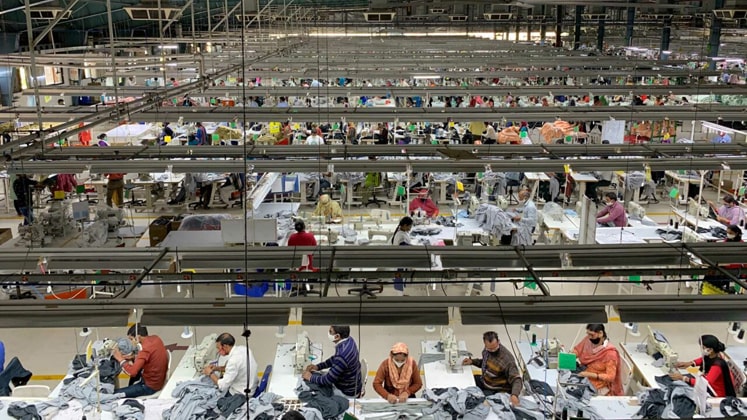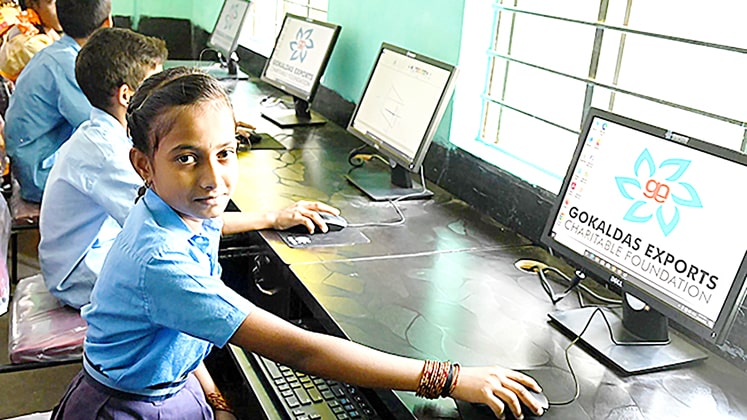
The apparel manufacturing industry employs around 11 million workforce across India (the number is around 45 million including the textile industry). Around 65-70 per cent of this workforce are women operators, the backbone of the industry, and apart from a few exceptional cases, these workers are being well taken care of. Not only the law of the land or buyers’ instructions are being followed, but factories are also going beyond that as they have understood it well that a happy and loyal worker is most productive and retaining them will not only bring better quality work consistently but also increased revenue.
There are a variety of initiatives taken up by various factories for their workers. These include work-specific technical and soft skill training, sessions on safety at the workplace, women’s safety and policies around these areas. Many companies don’t ask workers to work beyond standard time so that they can have enough time for themselves and their family also. This ensures that the manpower is happy and comes daily to work for better performance. Some companies have buses to pick up and drop workers at nearby villages, provide lunch to them at subsidised rates and also give proper hostel or dormitories’ support to migratory workers. They conduct daily meditation sessions too. Breaking taboos, ensuring menstrual hygiene and providing sanitary napkin vending machines are the growing trends being observed in garment factories.
Many factories are focusing on providing decent infrastructure such as having centralised AC on the shopfloor for comfortable working. They also put up plants in their premises for better flow of oxygen.
To engage their workforce and enhance better coordination as well as fun, various factories are organising a variety of events which include diverse sports activities, outings, capacity development-based workshops by life coaches and various types of training. Industry leaders also have collaboration with leading business schools to train their middle and top-level management. Annual day celebration is a major concept for companies to boost and recognise their workers’ and staff’s contribution. Scholarships to the children of workers and support for higher studies is a common practice.
The one initiative that has empowered the workforce is the seriousness of the companies for Grievance Redressal Mechanism and committees for addressing the needs and issues of the workers. The idea at the core of all such initiatives is comfortable working, healthy and happy workers and there is a tilt towards the health of workers.

For years, many garment factories used to give jaggery to their workers to reduce the negative impact of lint of fabric, similarly, workers’ eye check-up and other such health camps are also part of the routine activities. Factories are now moving forward and putting thrust on the proper nutrition of their workers and also supporting the women workforce with various tests, counselling and diagnosis.
Apparel manufacturers are collaborating with NGOs or civil societies to support their workers. In one such collaboration with the Rotary Club and KMCH Hospitals in Coimbatore,Tirupur-based Eastman Exports Global Clothing is providing free Mammogram and Pap smear tests for its women workforce. The export house has more than 12,000 women working in its factories and head office. And such initiatives are very much required as due to a lack of awareness and also various taboos associated with these, women especially workers don’t go for proper and timely testing.
Pratibha Syntex recently, in partnership with Fair trade, distributed gift coupons worth Rs. 7000 to each of its 4575 employees at one of its units. The total amount of the coupons is more than Rs. 3.2 crore. Before this, the company had supported its 28 workers by gifting them houses. There are many more such initiatives being taken up by the company for its workers.

The thrust is also on global issues like gender equality and inclusion. Apart from a few rare examples, women are treated fairly and have equal rights as male workers. Hubs in South India and Bengaluru are leading with the majority of women workforce, North India is now also having more women workers in factories.
A Delhi-based leading apparel exporter associated with IMPAct 4 Nutrition (I4N) Platform, an Ahmedabad-based non-profit organisation, surveyed its workers and found that many of them are not having proper breakfast. The export house did its proper counselling in this regard and also planned to take up initiatives to improve their overall health. It is now serving sprouts as evening snacks while earlier samosas were being served.
Supporting society with a holistic approach
The beauty of CSR activities by Indian apparel companies is the large spectrum they cover. This includes not only donations but also setting up migrant support centres, public health centres, organising and supporting blood donation camps, availability of drinking water, drug-free India, education societies, supporting universities, promoting awareness and screening of cervical cancer, promoting environmental and community management, contributing to Swach Bharat Koshand other such initiatives of Government, supporting war widows, promoting sports and athletes.
Industry leaders have holistic CSR policy as most of them believe in trusteeship, i.e., looking beyond commercial interests and making a significant difference in communities. These interventions are based on need assessment too.
Nearly all the medium-size companies are associated with NGOs or religious trusts and support them in various ways, be it through financial donations or giving them leftover fabrics or garments for use.

All these efforts and initiatives sound interesting and effective, but on the other side, there were reports in the past highlighting that among the leading 50 companies of the Indian textile and apparel industry, only 10 were proactive while 15 were active and 30 companies were passive in their approach. It has been also alleged that even top companies misuse their CSR funds.
It is worth mentioning here that companies with a certain scale of business are legally bound to do CSR activities such as those with a net worth of Rs.500 crore or more, or turnover of Rs.1,000 crore or more, or a net profit of Rs.5 crore or more during the immediately preceding financial year. They are expected to spend 2 per cent of the average net profits of the immediately preceding three years on CSR activities.
There is no such legal obligation for companies that don’t have such scale and these companies are present in large number as the majority of the Indian textile and apparel industry is in the MSME sector.
Buyers’ involvement also a major factor
Indian apparel industry is highly supportive towards worker welfare and encourages education and various social activities by international brands and retailers. Brands like Mango are extremely concerned about the suppliers’ CSR and sustainable initiatives, be it a food programme aimed at people who live in the slum area of Ganesh nagar (Mumbai), or supporting the disabled women in Anantapur (Andhra Pradesh) to mention a few. There are many other such examples of various brands and retailers.
Brands having a holistic approach to sustainability and CSR issues go beyond basic issues at times, for example, recently for the first time, M&S engaged its colleagues in India in conversations that focused on Pride and LGBTQ+ rights as part of its Inclusion and Diversity (I&D) initiatives. As a result of this engagement, the brand is reviewing its policies, benefits and overall experience for colleagues in India. It aims to create a culture where its people can bring their entire self to work, or as much of themselves as they’re comfortable with. While this is simply the right thing to do, it’s also the best thing to do – as we know when people feel they belong, they perform better too.
Not a big deal, if like-minded apparel factories that are working closely with M&S can follow the same or at least do something in the similar direction.
To improve further…The entire industry must work towards improving its reputation as sadly, working in a garment factory is not considered a great thing. Providing a safe and clean environment, paying salary on time, providing ESI & PF are not benefits but rather these are legal obligations. Many factories don’t have proper HR systems in place to ensure worker well-being. So the line of communication between the management and the workers must be kept open and available. Industry must realise that retaining existing workers is easier than hiring new workers and training them. Factories are lacking systems for reward and recognition. If a worker learns additional skills, his/her salary must be incremented immediately so that they are encouraged to learn more and add more value to the factory. The concept of ‘attendance bonus’ is detrimental as factories give this bonus so that the workers attend the workplace but the big question is if they work efficiently or not. Sridhar Rajagopal, Chief Mentor, REDEFINE, Bengaluru |






